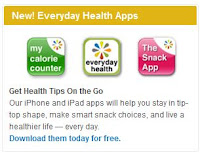
I find that of all of the topic areas that I cover in Health class, it's the nutrition unit that students react most positively to. It's also the topic area that hopefully they think about on a daily basis. Every day they get to choose what to have for breakfast, lunch and dinner. I enjoy those moments in the cafeteria when I see students of mine standing in line for the less healthy (cough!) food items and with the raise of one eyebrow (a la Roger Moore) I can guilt them into making a healthier choice.
In class we used the Government diet analysis tool found at www.mypyramidtracker.gov This assignment revealed that the website, although free and easily accessible, has its faults. Users plug in their diet and the site will analyze the contents of the foods letting you know how healthy, or otherwise, your diet may be. However,if you eat ethnic or cultural foods you probably won't find these on the site. Also if you make your own foods then you also will find the site lacking.
As is common every year the results are always cause for much discussion with students realizing that their diet isn't as healthy as they thought. I asked students this semester to condense all of the information and reflect upon their diets....in less than 140 characters. The student submissions were of a very good standard and can be found at this link.
With an i-Tunes gift card being awarded to the best submission I can reveal the top three answers, as chosen by teachers, peers and some of the people that follow @carmelhealth on Twitter.
1. "Through My Healthy Plate inputs I learned that my fat, sodium, sugar & calorie intake is better when I eat meals with my family" I felt that this reflection was particularly good as not only did it show evidence of dietary analysis but that it also showed how improvements could be made. Eating together with the family, particularly when eating at home, is so beneficial to our physical, mental and social health. What's that old adage? The family that eats together stays together?
2. "Many ppl, including myself have been tricked w/the so-called healthy foods. In order 4 me 2 improve my diet I need 2 b more careful" This reflection again showed greater reflection and was particularly health literate. I agree that food manufacturers can do so much more to educate us as consumers but perhaps this isn't in THEIR best interest. If we had better information to make healthier choices would we buy less of the profit-making, addictive junk food? I think so.
3. "I should watch my fat & salt intake while aiming to eat more fruits & vegetables, because my diet is mostly just proteins & grains" This response identifies both the strengths and weaknesses of this individuals diet. Proteins and grains are essential components of the healthy plate but it is important that a balanced diet also includes fat and salt. Although those latter two foods are needed to a much lesser extent, they do both allow our body to work more efficiently.
What is your diet like? Are there foods that you eat that maybe you could make a healthier choice? What impact has your family diet had on the health of your family? Please feel free to share your comments below.











